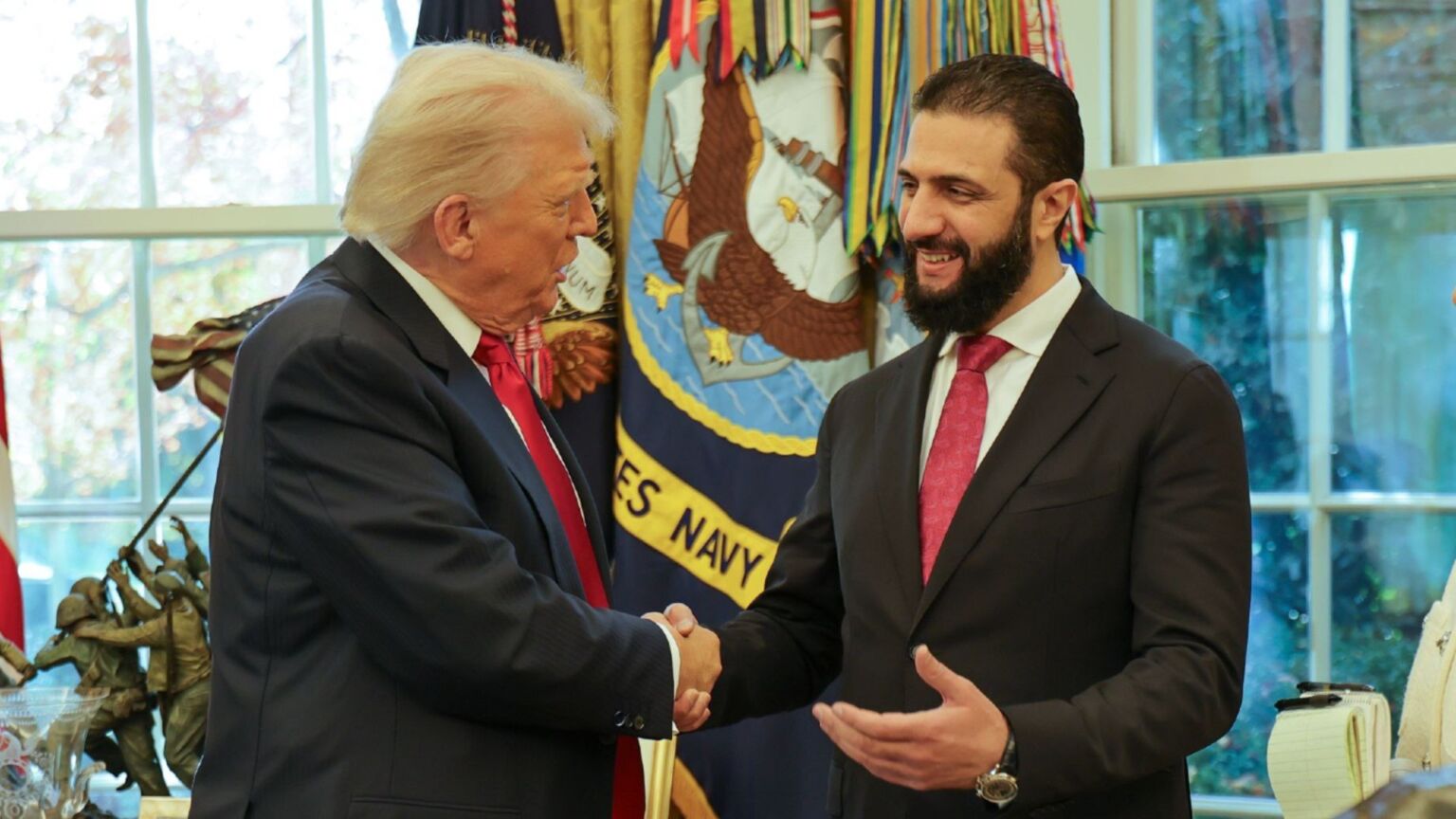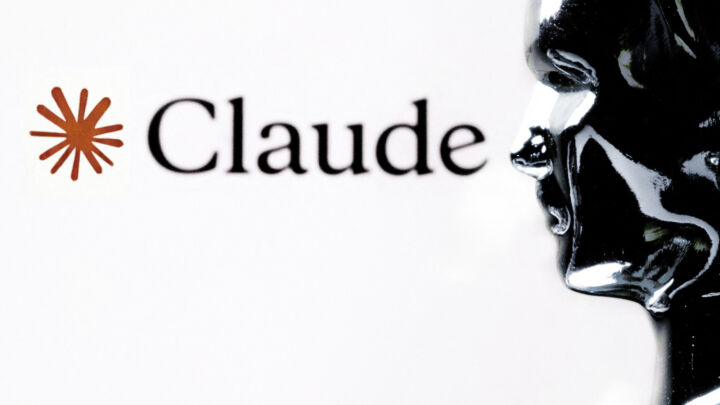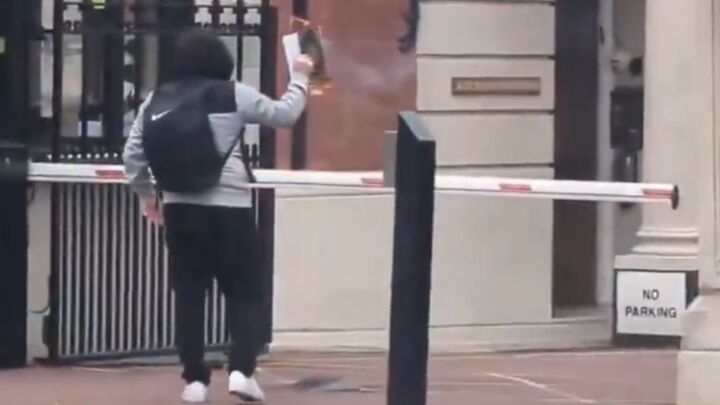Mr Sharaa goes to Washington
How a former al-Qaeda fighter became the first Syrian leader to visit the White House.

Want unlimited, ad-free access? Become a spiked supporter.
For the first time since Syria gained independence in 1946, a Syrian leader has set foot in the White House. Very few would have put money on that leader being a one-time member of al-Qaeda. But there Syrian president Ahmed al-Sharaa was on Monday afternoon, shaking hands with his US counterpart, Donald Trump.
Admittedly, this was a low-key White House visit. The man who up until last year was known by his nom de guerre, Abu Muhammad al-Jolani (‘The Man from the Golan’), entered through a side door. There was no photo opportunity with Trump out front, no joint press conference, no real fanfare.
But it was a hugely significant moment nonetheless, building on months of American and European diplomatic engagement with the Syrian leader. As Sharaa put it at the United Nations General Assembly in September, Syria is ‘reclaiming its rightful place among the nations of the world’. After their two-hour-long behind-closed-doors meeting, Trump said he ‘liked’ Sharaa, adding, ‘he has had a rough past’.
Which is one way of putting it. Before he effortlessly seized power from the decrepit regime of Bashar al-Assad last December, the now 43-year-old Sharaa had played a key role in the wave of militant Islamist reaction that has swept the Middle East over the past 20-odd years. Inspired by Hamas’s first uprising against Israel at the turn of the millennium, and later al-Qaeda’s attack on the Twin Towers in 2001, the young Sharaa joined up with al-Qaeda in Iraq against the US and its allies and then fought for al-Qaeda affiliate al-Nusra Front during the Syrian civil war. In between these stints waging jihad, he spent time as an inmate in Iraq’s military prisons, including the notorious US-run Abu Ghraib – a testament, allegedly, to his lethal, soldier-killing achievements as a bombmaker.
By the time Sharaa had taken control of a significant part of north-western Syria in 2017, as the leader of al-Nusra Front rebrand Hayat Tahrir al-Sham, he was honing a distinctly repressive Islamist style of government – one that some in Syria, especially in minority communities, fear will eventually be imposed on Syria itself.
It’s Sharaa’s ‘rough past’, as Trump put it, that shows just how remarkable Monday’s confab in the White House was. Here we saw the US president warmly greeting a leader whom, just a year ago, Western nations still classified as a terrorist, complete with a $10million bounty on his head. A man whom, 20 years ago, the US would have been fighting against in its post-9/11 War on Terror, the interminable series of military interventions that did so much damage to the Middle East.
And yet, this week, the US president has been breaking bread with him. Treating him as an ally. Promising to ‘do everything we can to make Syria successful’.
There was substance behind the smiles and handshakes, too. Trump said he would renew a six-month suspension of the Caesar Act, the 2019 package of sanctions that has impeded any chance of Syria’s reconstruction. In return, Sharaa has promised his forces will join the US-led military coalition battling the Islamic State, now resurgent in parts of Syria.
There is a geopolitical rationale to this rapprochement between the White House and a one-time cheerleader for 9/11. The US is keen to pull Syria into its regional orbit, and away from Iran – which had propped up Assad’s brutal dictatorship until its fall last year. In doing so, a US-Syria alliance potentially denies Tehran a vital supply route to Hezbollah, its proxy militia in Lebanon. It’s a move that benefits the US’s main regional ally, namely Israel.
Sharaa also has an interest in firming up a relationship with the US beyond sanctions relief. Above all, this would bring Syria closer to the US’s other wealthy regional allies, Saudi Arabia and the Gulf states.
Although it should be said that Sharaa is looking several ways at once. While cosying up to the US and Western nations in general, he is also keen on maintaining good relations with Moscow, despite the latter’s support for Assad. After a meeting with Russian president Vladimir Putin last month, Sharaa indicated that Russia would be allowed to retain its military bases in Syria.
Yet while Sharaa plays the statesman, pressing the flesh of the world’s powerbrokers, the question over what state he is trying to build remains open. After a devastating, years-long civil war, shaped as much by external, regional actors as by internal ones, this is less a nation than a patchwork of territories, from the Kurdish autonomous zone in Syria’s north-east to the Alawites on the Mediterranean coast to the now-ruling Sunni factions in Damascus.
Syria today is not dominated by a centralised state. Rather, it is criss-crossed by myriad armed groups, often of an Islamist persuasion, which are only nominally loyal to Sharaa’s government. There is plenty of evidence to suggest that these government-aligned militias are responsible for several atrocities carried out against Syria’s Alawite and Druze minorities over the past 10 months. The spectre of renewed civil war continues to haunt this ravaged country.
Sharaa has indulged in plenty of West-friendly patter about protecting minority rights, promoting women’s inclusion and establishing the rule of law. And after toppling Assad, he was at pains to suggest that his government would be part of a five-year transition to a more democratic state.
But aware of his authoritarian, Islamist past and some of his government’s present actions, many have their doubts about Sharaa’s sincerity. These are unlikely to be assuaged by this weekend’s elections, in which only a few thousand, hand-picked Syrians were allowed to take part. Even then, those elected to Syria’s new legislative body will have very little ability to challenge Sharaa’s authority. Many Syrians claim they weren’t even aware an election was taking place.
So this may have been a momentous week for Syria on the world stage. As unlikely as it seems, under the leadership of an ex-member of al-Qaeda, it looks to have shed its pariah status. But within this still broken nation, the future looks as uncertain and dangerous as ever.
Tim Black is associate editor of spiked.
You’ve hit your monthly free article limit.
Support spiked and get unlimited access.
Support spiked and get unlimited access
spiked is funded by readers like you. Only 0.1% of regular readers currently support us. If just 1% did, we could grow our team and step up the fight for free speech and democracy.
Become a spiked supporter and enjoy unlimited, ad-free access, bonus content and exclusive events – while helping to keep independent journalism alive.
Monthly support makes the biggest difference. Thank you.











Comments
Want to join the conversation?
Only spiked supporters and patrons, who donate regularly to us, can comment on our articles.